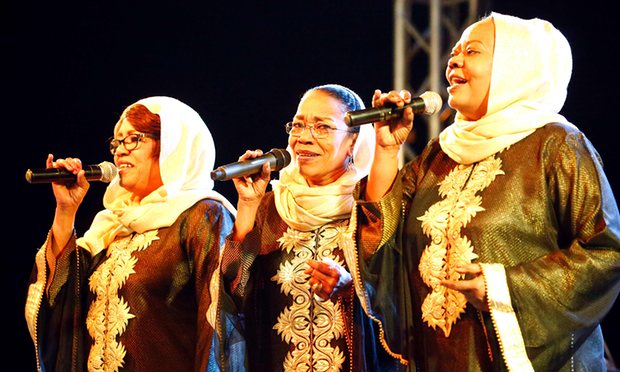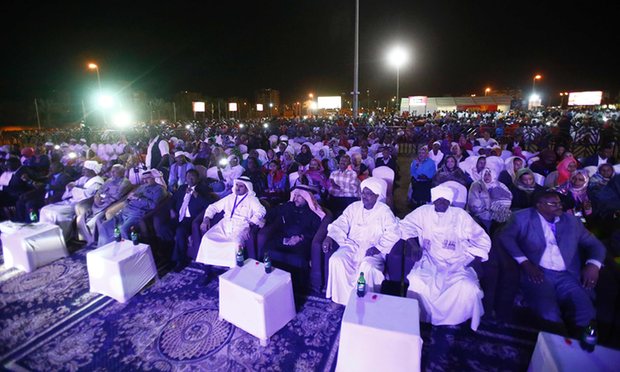
Photograph: Ashraf Shazly/AFP/Getty Images
Stepping onto stage in Khartoum and launching into their first song, The Nightingales – Sudan’s best-loved girl band – still raise cheers from adoring fans, 45-years after their debut.
Sisters Amal, Hadia and Hayat Talsam were known in their 1970s heyday as the “Sudanese Supremes” with their stylish bobs, matching dresses and soulful ballads, which changed the image of female artists in Sudan forever.
Their outfits have changed a bit since – at the January concert in Khartoum, the sisters appeared in long robes and loose headscarves – but the audience’s adoration has only increased.
Their vintage brand of Sudanese pop, songs of longing and youth blending elements of folk music aim to show the world another side to Sudan.
“We want to travel the globe and offer our art to all the peoples of the world,” Amal said after the concert, sitting beside her sisters.
“We could show a beautiful side of Sudan to the outside world” added Hadia, the oldest of the three. Although they haven’t got round to planning their global tour just yet.
The vibrant but conservative 70s
The Nightingales were formed in 1971, when a family friend visited their home in Omdurman – Khartoum’s twin city – to ask their father if he could pick three of his seven daughters to perform one of his songs.
The trio performed so well that they made the arrangement permanent and they were picked to tour Sudan with then president Jafer al-Nimeiri, a socialist-leaning army officer who seized power in the revolution of 1969.
“It was a very, very vibrant period for culture and art,” explained Hayat.
Amal was 15, Hadia 17 and Hayat just 13 years-old when they started touring, attracting fans across the region.
But in socially conservative 1970s Sudan, not everyone was pleased to see three young women travelling unaccompanied and singing and dancing in front of crowds.

But the sisters won general acceptance with support from their family. “The Nightingales changed the way people looked at female artists in Sudan,” said Hadia.
The group didn’t change the act and even sang one of their songs on the state broadcaster – other female artists had preceded them but their music had been more traditional.
As their fame grew. Neighbours, friends and even some relatives criticised their father, traditionally the head of the household, for their appearances.
“[He] wasn’t interested in any of that and he used to encourage us a lot,” Hadia said proudly.
“We were able to stand firm… our progress and our presence on stage proved that there was nothing wrong with it,” Amal added.
By the 1980s, the group had cemented their reputation as one of the country’s best loved groups, but Sudan was changing.
Nimeiri grew increasingly paranoid and repressive toward the end of his 16-year reign, declaring sharia law in 1983 and igniting another civil war between the north and the south.
The Nightingales kept going but in 1988, all three tied up with other commitments, they played their final concert in Khartoum.
Amal and Hadia left for the Gulf with their families, before moving to the US, and Hayat stayed in Khartoum.
By 1989 the current president Omar al-Bashir had come to power in an Islamist-backed coup and his military authorities imposed a curfew that lasted for years – effectively banning musical performances.
The reunion
Hadia and Amal returned the following year and organised a concert with Hayat at the officers’ club in central Khartoum.
They were apprehensive, unsure whether their fans would remember them, but on arrival, the streets were jammed with expectant fans.
“The only thing that changed was they liked us much more,” Amal said.
Now, the Nightingales tour Sudan when they are all in the country together, drawing hundreds of fans of all ages to their shows.
They still sing in matching outfits, with performances punctuated by mid-set costume changes – and a quick cigarette break.
Amal, Hadia and Hayat are now confident they can win more fans abroad and are keen to arrange their tour.
Would the comparison with the Supremes help draw foreign crowds in?
“Honey, we’re better than the Supremes,” Amal shot back in American-accented English.
